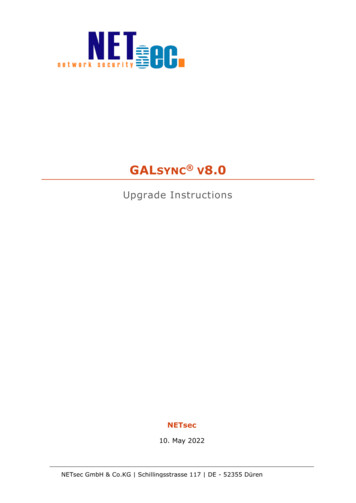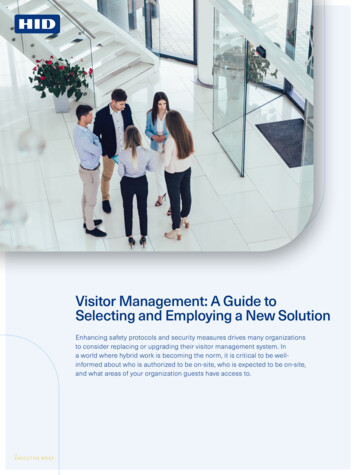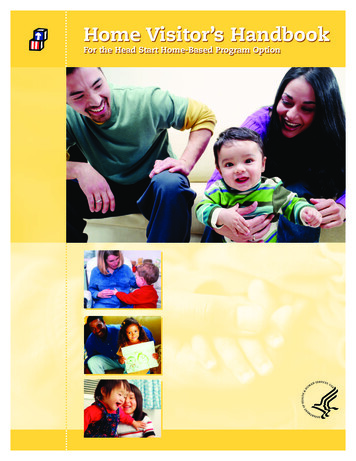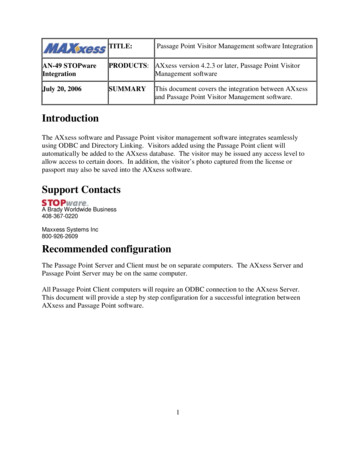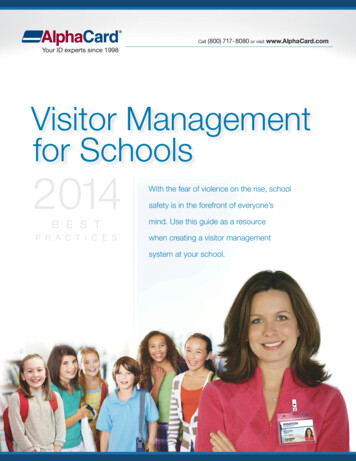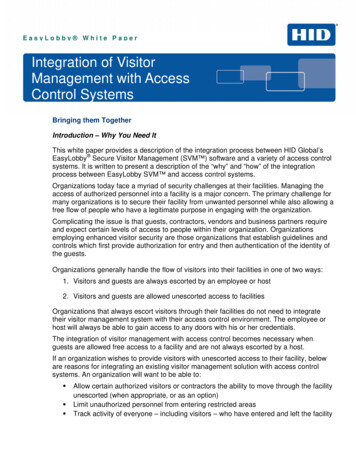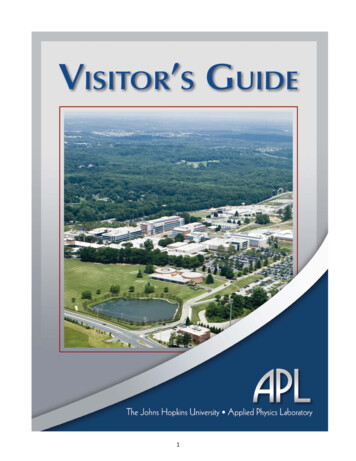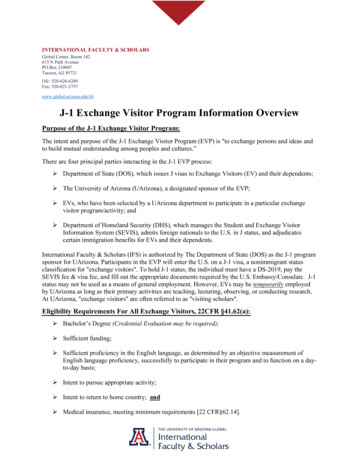
Transcription
INTERNATIONAL FACULTY & SCHOLARSGlobal Center, Room 142615 N Park AvenuePO Box 210087Tucson, AZ 85721Ofc: 520-626-6289Fax: 520-621-2757www.global.arizona.edu/ifsJ-1 Exchange Visitor Program Information OverviewPurpose of the J-1 Exchange Visitor Program:The intent and purpose of the J-1 Exchange Visitor Program (EVP) is "to exchange persons and ideas andto build mutual understanding among peoples and cultures.”There are four principal parties interacting in the J-1 EVP process:Ø Department of State (DOS), which issues J visas to Exchange Visitors (EV) and their dependents;Ø The University of Arizona (UArizona), a designated sponsor of the EVP;Ø EVs, who have been selected by a UArizona department to participate in a particular exchangevisitor program/activity; andØ Department of Homeland Security (DHS), which manages the Student and Exchange VisitorInformation System (SEVIS), admits foreign nationals to the U.S. in J status, and adjudicatescertain immigration benefits for EVs and their dependents.International Faculty & Scholars (IFS) is authorized by The Department of State (DOS) as the J-1 programsponsor for UArizona. Participants in the EVP will enter the U.S. on a J-1 visa, a nonimmigrant statusclassification for "exchange visitors". To hold J-1 status, the individual must have a DS-2019, pay theSEVIS fee & visa fee, and fill out the appropriate documents required by the U.S. Embassy/Consulate. J-1status may not be used as a means of general employment. However, EVs may be temporarily employedby UArizona as long as their primary activities are teaching, lecturing, observing, or conducting research.At UArizona, "exchange visitors" are often referred to as "visiting scholars".Eligibility Requirements For All Exchange Visitors, 22CFR §41.62(a):Ø Bachelor’s Degree (Credential Evaluation may be required);Ø Sufficient funding;Ø Sufficient proficiency in the English language, as determined by an objective measurement ofEnglish language proficiency, successfully to participate in their program and to function on a dayto-day basis;Ø Intent to pursue appropriate activity;Ø Intent to return to home country; andØ Medical insurance, meeting minimum requirements [22 CFR§62.14].
Documents Required to Enter the U.S. as a J-1 Exchange Visitor:An EV may apply for a J-1 visa at a U.S. Embassy/Consulate abroad, https://www.usembassy.gov/, afters/he receive the DS-2019 Form. However, DOS may not issue a J-1 visa more than 90 days prior to thestart date listed on the DS-2019 Form. Moreover, an EV may not enter the U.S. more than 30 days beforethe start date listed on the DS-2019 Form. Before applying for a J-1 visa for initial entry to the U.S. in J-1status, EVs must pay the SEVIS fee and obtain a receipt of payment. Information regarding the SEVIS feepayment is available at https://www.fmjfee.com/i901fee/ .In addition to the required documentation listed below, EVs should bring an original invitation letterwritten by the supervising faculty/staff and financial documentation indicating sufficient funding tosupport the EV (and their dependents).Ø A valid passport (valid for at least six months beyond the date of arrival);Ø A valid DS-2019 Form issued by IFS; andØ SEVIS fee receipt, if applicable.*Please note that Canadian citizens are exempt from the visa requirements. Canadians must present theDS-2019 Form, SEVIS fee receipt, a valid passport (at least 6 months beyond the end of prospectiveprogram date), and financial guarantee upon entering the U.S.Exchange Visitor Categories and Time Limitation:IFS is authorized by DOS to participate in only the following categories:Exchange Visitor CategoryMinimum DurationMaximum DurationProfessor or Research Scholar3 weeks5 years (continuous)Short-Term ScholarN/A6 MonthsSpecialist3 weeks12 monthsProfessor and/or Research Scholar, 22CFR §62.4(e) & (f):Professor and Research Scholar are two separate categories but, because they are related, the regulationsgoverning them are contained in the same subsection.A Professor is defined as an individual engaging primarily in teaching, lecturing, observing, or consulting.A Professor may also conduct research, unless disallowed by the sponsor.A Research Scholar is defined as an individual primarily conducting research, observing, or consulting inconnection with a research project. The Research Scholar may also teach or lecture, unless disallowed bythe sponsor.An EV may participate as a Professor or Research Scholar for a minimum of 3 weeks to a maximum of 5years. The 5-year maximum begins on the start date listed on the DS-2019 Form and runs continuouslyregardless of program participation. 5-year period is "use or lose," not an aggregate.
The 5-year period afforded to an EV is on a ‘use or lose’ basis which commences with the program begindate identified on the DS-2019. For example, a research scholar who comes to an institution for 2 yearsand returns to their home institution for 9 months will be eligible, as a program matter, to return to thesame U.S. institution - or transfer to another - for an additional 2 years and 3 months. If the participantdoes not return to the U.S. until 3 months later, they have 2 years remaining on their program.70 Fed. Reg. 28815 (May 19, 2005).*SEVIS record must be continuously maintained to take advantage of the full five-year eligibility. Thisrequires the Exchange Visitor and hosting UArizona department to submit an Out of Country request toIFS for any period of time outside of the US that exceeds 30 days prior to the scholar’s departure.Academic Credentials: A DS-2019 Form with the EV category listed as “Professor”, “Research Scholar”or “Short-term Scholar” should have a minimum education level of bachelor’s degree. It is highlyrecommended that the EV obtain an academic evaluation of their credentials. EVs have had difficultyobtaining visas to enter the U.S. without demonstrating the appropriate level of credentials to the consularofficials conducting their visa interviews. For example, statements from the home institution where thedegree was obtained or letters from the UArizona attesting to the equivalency of an EV’s education levelhave resulted in visa denials.Tenure-Track and Permanent Appointments, 22 CFR § 62.20(d)(1):The participant shall not be a candidate for a tenure-track position. This requirement means that a J-1Professor or Researcher cannot hold tenure or be placed in a “tenure-track” position. An EV can, however,occupy a position temporarily even if the position is normally tenured or tenure-track. For example, an EVmay occupy, in a visiting capacity, a position that is normally tenured or tenure-track, such as serving as aVisiting Professor in a position held by a tenured Professor who is on sabbatical.Twelve-Month Bar AFTER Previous J-1 Participation, 22 CFR §62.20(d)(2)(i-iii):Time spent in the U.S. in another J status may affect a foreign national's eligibility for participation as aProfessor or Research Scholar. An individual is not eligible to "begin a new program" if they werephysically present in any J status (including J-2 status) for 6 months or more during the immediatelypreceding 12 months start date listed on the DS-2019 Form, unless:ØØØthe participant is transferring to UA’s EVP in the same category, orthe participant’s presence in the U.S. was of less than 6 months’ duration, orthe participant's presence in the U.S. was pursuant to a "Short-Term Scholar" exchange activity.Short-Term Scholar, 22CFR §62.4(b):A Short-Term Scholar is defined as a Professor, Research Scholar, or a person with similar education oraccomplishments coming to the U.S. on a short-term visit for the purpose of lecturing, observing,consulting, training, or demonstrating special skills at research institutions, museums, libraries, postsecondary accredited educational institutions, or similar types of institutions. The Short-Term Scholar mayalso engage in collaborative research.The Short-Term Scholar category is not subject to the 3-week minimum length of program requirement. Itis therefore an ideal category for programs and visits of short-term duration lasting anywhere from one dayto a maximum of 6 months. A short-term scholar may extend their stay up to the 6-month maximum ortransfer to another J-1 program.Extensions beyond 6 months are not permitted within the “Short-Term Scholar” category. The 6month maximum begins on the start date listed on the DS-2019.
Academic Credentials: Like Professors and Research Scholars, Short-Term Scholars are expected to haveappropriate academic or similar credentials. A prospective Short-Term Scholar should have at least abachelor’s degree with significant experience in the field of endeavor.Specialist, 22CFR §62.4(g):A Specialist is defined as an individual who is an expert in a field of specialized knowledge or skillcoming to the U.S. for observing, consulting, or demonstrating special skills.An EV may participate in the Specialist category for a minimum of 3 weeks up to a maximum of 12months.Academic Credentials: Specialists must demonstrate that they are experts in a field of specializedknowledge or skills. The defining criteria are unique to each field of expertise. The Specialist mustdemonstrate that they are recognized as experts in their field.Alien Physician (M.D.), 22CFR §62.4(g):IFS is authorized to issue the DS-2019 Form to alien physicians to enable them to come to the U.S. for theprimary activity of observation, consultation, teaching, or research only. They can participate in a nonclinical exchange program, with no patient contact or care, or where patient contact is only incidental* tothe primary activity. Professor, Research Scholar and Short-Term Scholar categories are designed for theseactivities.Acceptable Activities:Ø Diagnostic examination in the presence of a senior physician who repeats the examination orensures at every step that it is done correctly, and that proper diagnostic information is obtained;Ø Being present during therapies and treatment with opportunities for hands-on experience in waysthat do not compromise the care of the patient; and/orØ Being present in the operating room and having no patient contact, and not performing procedures.If the primary purpose of the EV’s participation in the J-1 program is of a clinical nature, the EV may notbe issued a DS-2019 under UA’s J-1 program. In such cases, the alien physician must be issued a DS-2019from the program of Educational Commission for Foreign Medical Graduates (ECFMG). Departmentsmust contact the Graduate Medical Education (GME) Office at 626-7878 for participation of this nature.IFS does not process these types of ate/graduate-medical-education/university*Exchange Visitors who will be participating in an EVP with incidental patient contact will berequired to complete additional documentation with IFS.
Mandatory Health Insurance Requirement, 22CFR §62.14:All EVs (both J-1 principals and J-2 dependents) are required to have sickness, accident, medicalevacuation, and repatriation insurance in effect for the entire duration of their EV status including whennot in the U.S. A willful failure to carry insurance is considered to be a violation of the EVP regulations.EVs are required to show proof of health insurance in order to validate their J-1 program initially, and forany future extension and requested travel signatures.Being benefits eligible through UArizona does not automatically cover what is federally mandated.Please read the following Federal Regulation:All Exchange Visitors are required to carry sickness and accident insurance, as well asrepatriation and medical evacuation insurance, for themselves and any J-2 dependents during theEV’s program. The regulations have specific minimum requirements for such coverage. 22CFR§62.14. It is the responsibility of the EV program sponsor to advise the EV of therequirements for this coverage and to terminate an EV who willfully fails to carry the requiredinsurance coverage. 22 CFR§62.40(a)(4).Because some J-1 professors, research scholars, and short-term scholars are paid by the collegeor university, they may be eligible for an institutional insurance plan. However, most of theseplans do not provide coverage for medical evacuation or repatriation, so this coverage must beprovided in another way. Some EVs, especially those who have funding from a private orgovernmental organization, may have coverage through another group plan offered by the fundingsponsor. It is clear that DOS takes the requirement to maintain health coverage very seriously, asit is considered a serious infraction and those who have failed to maintain insurance coverage arenot eligible for reinstatement. 22 CFR§62.45(f)(1).For more information about the federal requirements and purchasing health insurance please see pg. 5 ofthe Pre-Arrival Packet. Further questions or concerns, please contact IFS at uifs@email.arizona.edu or call520-626-6289.For more additional information about health insurance, and/or purchasing health insurance, please callCampus Health Services ing-scholars
J-1 Status: 2 Year Home Residency Requirement, INA §212(e); 22CFR §41.62(c)-(d) &§41.63(c)EVs may be subject to the 2-year home residence requirement, “212(e)”, based on one or more of thefollowing:1. They received funding from the U.S. Government, their own government, or an internationalorganization in connection with their participation in the EVP;2. The education, training, or skill they are pursuing in the U.S. appears on the EV Skills List (2009Amendment) for their country:a. hange-visitor-skills-list.html,b. t, or3.for the purpose of receiving graduate medical education or training.If the U.S. Embassy/Consulate officials determine that the EV is subject to §212(e), an annotation will bemade on the visa stamp in their passport as "§212 (e) Two Year Rule Applies”. In addition, a preliminaryendorsement by the consular or immigration officer regarding section §212(e) is also marked on their DS2019 Form.Until the EV either complies with or is granted a waiver of the two-year requirement, they:Ø Are not eligible to apply for a change of status to H-1B and some other immigration statuses;and/orØ change status to most other non-immigrant statuses from within the U.S.If the principal J-1 EV is subject to §212 (e), all dependents who enter the U.S. in J-2 status are alsosubject.EVs who are subject to, but do not wish to comply with the two-year home country residence requirement,may apply for a waiver of that requirement under any one of the five applicable grounds provided byimmigration law. For more information about §212(e) and instructions for applying for a waiver, pleasevisit the DOS sitor.htmlOnce an EV receives notification of the DOS recommendation for a waiver, the EV is no longer eligiblefor further extensions of their J-1 status, although they may continue their current J program for theremainder of time listed on the DS-2019.*If the EV wishes to apply for the waiver, s/he should contact IFS prior to submitting the online waiverapplication.
24-Month Bar On Repeat Participation, 22CFR §62.20(i)(1)-(3)An individual who participates in the EVP as a Professor or Research Scholar becomes subject to a 24month bar, "Repeat Participation" after completing their program. The 24-month bar applies under twocircumstances:1) If the Professor or Research Scholar completes a full 5 years of program participation with one ormore sponsors; or2) If the Professor or Research Scholar completes their program before the full 5-year period is over.In this case, the continuity of the 5-year period is broken, the 5-year window is "closed," theindividual is not eligible to access the remaining unused time, and the individual must wait for 2years before beginning a new program as a J-1 Professor or Research Scholar.You may also hear the 24-month bar on repeat participation referred to as the 2-year bar on repeatparticipation. In this information packet, we refer to it as the “24-month bar”, to distinguish it from the§212(e) 2-year home residence requirement. DOS has also begun referring to the bar as the "24-monthbar”.EVs who have entered the U.S. under the EVP as a Professor or Research Scholar, or who have acquiredsuch status while in the U.S., and who have completed their program are not eligible for participation as aProfessor or Research Scholar for a period of two years following the end date of their programparticipation as identified in SEVIS (whether or not all 5 years of participation have been used).The 24-month bar is not a home-residence requirement. The 24-month bar does not require the individualto reside in their home country as does 212(e) (2-year home residence requirement) nor does it require theperson to be out of the U.S. It requires only that the person not be in J-1 Professor or Research Scholarstatus for 2 years before becoming eligible for another 5-year period of program eligibility in J-1 Professoror Research Scholar status.12-Month Bar, 22CFR §62.20(d)(2)22 CFR § 62.20(d)(2) establishes what is referred to as the "12-month bar." The general proposition of the12-month bar is that an alien is not eligible to begin a new exchange program as a Professor or ResearchScholar if they were physically present in any J status (including J-2 status) for "all or part of" the "twelvemonth period immediately preceding the date of program commencement set forth on their Form DS2019." This general rule is then modified by 3 exceptions:1) J-1 transfers. The 12 month bar is not applicable to those who will begin a program by transferringto a new program sponsor under the transfer procedures of 22 CFR §62.42; or2) Presence in J-1 status of less than 6 months. An alien whose prior physical presence in J status wasless than six months in duration is exempt from the 12-month bar (but see discussion below); or3) Presence in J-1 status as a Short-Term Scholar. No time spent as a Short-Term Scholar under 22CFR §62.21 is counted as physical presence that triggers the bar.
General Instructions for Requesting a DS-2019:The standard processing time for a DS-2019 is 2-3 weeks, provided all the J-1 Initial & Transfer RequesteForms have been submitted in MyGlobal, IFS’s online request portal. And all the requireddocumentation has been uploaded, and the fees are submitted. Program dates, duties and/or activities mustbe specific.Fees: 450 – J-1 Initial & Transfer (All “new” requests) 300 – J-1 Extension (To extend an ongoing program) 150 – J-1 Amendment (changes/amendments to existing DS-2019) 50 – J-2 (per each dependent, regardless of when added/requested)Requests are generally paid by Internal Billing (IB).Requests for J-2 Dependents can be paid by Internal Billing (IB), or bank check/money order. No personalchecks.Required Documentation:Departments must submit a J-1 Initial & Transfer *request in MyGlobal, pay fee, complete all eForms andupload required documents before IFS will begin processing the request.1)2)3)4)5)6)J-1 Initial & Transfer Request submitted in MyGlobal;Copy of Scholars Passport (Biographical page only); Dependents (if any);Copy of Invitation Letter, Letter of Invitation Template;Proof of Funding (must be in English and USD)Proof of English language proficiency; RegulationsIB/eDoc and/or money order/bank check for processing fee.*Some required documents may vary, depending on the type of J-1 Request.Financial Documentation:The DS-2019 Form may be issued only for a period of time where there is documented guaranteedfunding. In addition, funding must meet minimal funding requirements and cover the entire period of timeon the DS-2019 for the EV ( 1772/month) and their dependents ( 620/month each).General institutional support cannot be considered government financing unless it was specificallydesignated for an international educational exchange program. Government funds made available fora specific research goal or to the principal research investigator and not for the use of supporting anindividual EV or an EVP should be designated as “funds from UArizona”. If the EV will receive a salaryfrom funds granted to UArizona (but not specifically granted to the EV) to support research projects,check UArizona as the funding source and list the total amount for the entire period of the DS-2019request.If the EV is not supported by UArizona funding, copies of financial documentation (personal bankstatement, on-line banking statement, and/or award letter) must be submitted. The documentation mustmeet the following criteria:
1)2)3)4)5)Contains the prospective EV's full name (as on passport);Document is no more than 6 months old at the time a DS-2019 is requested;Must be written in English or have been translated into English;Must specify the total amount;The amount must be in U.S. currency or converted into U.S. currency, http://www.xe.com.Mandatory Check-In with IFS Office:All EVs who are issued a DS-2019 for the purpose of either "beginning a new program" or "transfer” arerequired to check-in with IFS Office. The EV must report to IFS Office within 10 days of arrival ORcomplete the online J-1 Check-In eForm in MyGlobal and upload the required documents. If the EV failsto do so, his or her immigration record will become “NO SHOW” in SEVIS. This will cause problems forthe EV and potentially jeopardize his or her future J-1 status.During the check-in process, a mandatory (in-person) orientation will be scheduled in order to comply withDOS and SEVIS requirements.For in-person check in at IFS, the following documents are required to validate EV’s J Program: I-94 arrival/departure record printed from the CBP websiteOriginal DS-2019 form, signed and endorsed by the U.S. Consular OfficerPassport containing J visaCurrent U.S. home address and phone numberEmail addressProof of health insurance30 Day Validation Check-In with IFS Office:It is important that departments communicate with the EV often and inform IFS immediately if the EV'sarrival will be delayed. If this occurs, the start date of the DS-2019 may need to be amended.IFS is required by DOS and SEVIS to validate the EV's arrival within 30 days of the program start datelisted on the DS-2019. This only applies to EVs who are issued a DS-2019 for the purpose of either"beginning a new program" or "transfer." If the EV’s SEVIS record is not validated within 30 days, it willautomatically become "Invalid” (by DOS) or in some cases “No Show”. In this case, the EV will beconsidered in violation of program status by the DOS and may be considered in violation of theirnonimmigrant status. The EV will need to leave the U.S. immediately and make a new entry provided theyare eligible to return. Validation of the EV’s J Program/SEVIS record is done by IFS after the documentsabove are presented and approved.J-1 Extension within 5 Years for Professors and Research Scholars:Please login to request portal and initiate “J-1 Amendment & Extension”. Complete all eForms and uploadall required documents. Once request is submitted and approved, extended DS-2019 will be issued. IFSwill contact EV and sponsoring department when DS-2019 is available for pick up.*If the EV is subject to §212(e), applied for a waiver and received notification of the DOSrecommendation for a waiver, the EV is no longer eligible for an extension. However, s/he may continuein their current J program for the remainder of time listed on the current DS-2019.
Early Departure:If the EV discontinues their J-1 program with a department, the department must notify IFS, as IFS isrequired to report the event in SEVIS.Faculty sponsors and/or sponsoring departments must notify IFS immediately if the scholar departs or failsto participate in the exchange activities as notated on the DS-2019. UArizona is responsible for the EV’simmigration record until it is closed. Failure to appropriately notify IFS of an EV’s status could jeopardizethe entire J-1 Exchange Visitor Program at UArizona.In addition, departments need to notify IFS if an EV leaves the J-1 program more than 30 days before theend date on the DS-2019 Form. Please notify IFS as soon as the EV departs.30 Day Grace Period:Upon successful completion of the J-1 program, the EV will have an additional 30 days to remain in theU.S., however, s/he may not be employed, engage in research activities or perform unpaid workduring this 30-day grace period. The 30-day grace period is intended for purposes of traveling within theU.S., packing, and preparing for departure from the U.S.J-2 Dependent(s):Dependents are defined as the spouse and minor children (under 21 years of age) of the J-1 EV. Dependentspouses and children of J-1 visitors enter the U.S. on J-2 visas. Each dependent will need to use their ownDS-2019 in order to obtain a J-2 visa at the U.S. Embassy/Consulate and to enter the U.S. The EV cancomplete “add J-2” eForm and upload required documents during the request process. J-1 can add J-2dependents at a later time if s/he wishes. 50 additional fee is required for each J-2 dependent.J-2 status does not give the J-2 permission to work, but it gives the person the right/opprtunity to apply forwork authorization from USCIS. The J-2 does not have legal permission to work until the EmploymentAuthorization Document (EAD) is approved by USCIS, and EAD card is received.There is no restriction on study for J-2 dependents.A J-2 dependent's status terminates upon termination/completion of the J-1’s participation in the EVP.
A Research Scholar is defined as an individual primarily conducting research, observing, or consulting in connection with a research project. The Research Scholar may also teach or lecture, unless disallowed by the sponsor. An EV may participate as a Professor or Research Scholar for a minimum of 3 weeks to a maximum of 5 years.
